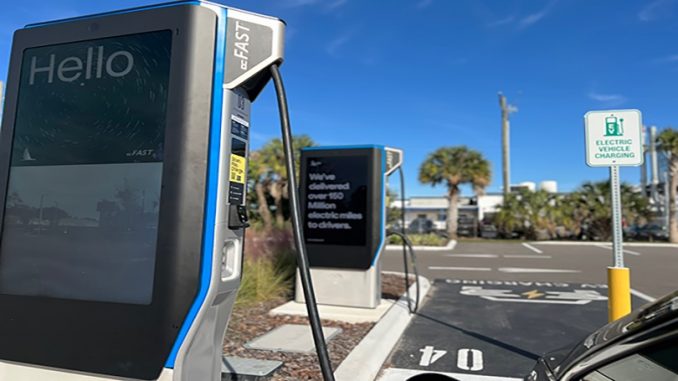
WASHINGTON — Nearly $150 million is being put to work by 24 grant recipients across 20 states in yet another White House–led investment in America’s clean energy future. The Electric Vehicle Charger Reliability and Accessibility Accelerator funding, awarded by the Biden-Harris Administration, will replace or repair roughly 4,500 existing electric vehicle (EV) charging ports.
Improving this existing infrastructure is key to the Administration’s goal of having 500,000 EV chargers in the ground and operating by 2030. With quadrupled EV sales under President Biden’s tenure, demand is growing, and these dollars will ensure America’s charging infrastructure is ready.
The effort is funded by the National Electric Vehicle Infrastructure (NEVI) Formula Program, created as part of the Bipartisan Infrastructure Law, to help states build convenient, safe, and reliable EV charging infrastructure across the nation.
“Making it easy for everyone to ride and drive electric means making sure drivers can always count on EV charging stations to work when they’re needed,” said Gabe Klein, Executive Director of the Joint Office. “Repairing and replacing existing stations gives drivers the confidence they need to choose electric, complementing the buildout of much-needed, new infrastructure while creating good jobs across the country.”
The Joint Office of Energy and Transportation is proud to support grant recipients with technical assistance as they endeavor to build a charging network drivers can count on the first time, every time.
For the full list of grant recipients visit www.fhwa.dot.gov
New Funding Enhances EV Charging Resiliency, Reliability, Equity, and Workforce Development

The Joint Office of Energy and Transportation has made available $46.5 million from President Biden’s Bipartisan Infrastructure Law for projects that bolster America’s electric vehicle (EV) charging infrastructure. The 30 projects across 16 states and Washington, D.C. will ensure convenient and efficient EV infrastructure for drivers; accelerate a resilient national EV charging network; grow the clean energy workforce; extend the benefits of clean transportation to rural, urban, and tribal communities; and validate real-world performance and reliability of high-power EV chargers.
The available funding will also address barriers to charging in multifamily housing facilities, explore new approaches to curbside charging in urban areas, promote seamless connections across modes through e-mobility hubs, and test new incentive structures to provide affordable public charging access.
“The Joint Office of Energy and Transportation is proud to fund these game-changing clean transportation projects in communities across the country,” said Gabe Klein, Executive Director of the Joint Office. “These investments ensure we can meet unique local needs, create good-paying jobs, innovate new business models, test products thoroughly, and work towards our goal of making it easy for everyone to ride and drive electric.”
The number of EVs on America’s roads has more than quadrupled since President Biden took office and these investments will be a crucial part of the Administration’s goal of building a national network of 500,000 public EV charging ports by 2030 and reaching net-zero emissions by 2050.
A full list of the awards increasing charger reliability, advancing new business models for electrified shared mobility and fleet-based services, and supporting underserved communities through new jobs and training resources is available at driveelectric.gov
About the Joint Office of Energy and Transportation
The Joint Office is a collaboration between the U.S. Departments of Energy and Transportation to support the buildout of a nationwide network of electric vehicle chargers, zero-emission fueling infrastructure, and zero-emission transit and school buses. Learn more at DriveElectric.gov.
Source: Joint Office of Energy and Transportation
